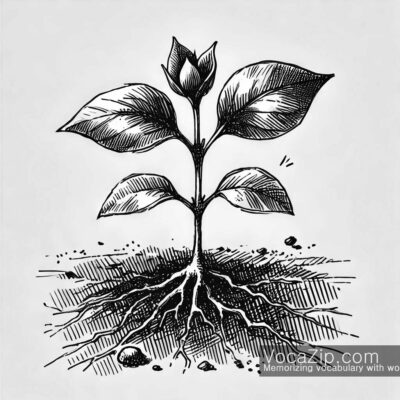bud meaning
bud :
bud, sprout
noun
▪ The bud will bloom in spring.
▪ The sprout will open in spring.
▪ The rosebud is very small.
▪ The rose sprout is very small.
paraphrasing
▪ blossom – flower bud
▪ shoot – young plant part

bud :
to grow, to sprout
verb
▪ The tree will bud in early spring.
▪ The tree will grow in early spring.
▪ Flowers bud in warm weather.
▪ Flowers grow in warm weather.
paraphrasing
▪ bud – sprout
▪ germinate – begin to grow
Pronunciation
bud [bʌd]
The stress is on the single syllable and sounds like 'bud'.
bud [bʌd]
The stress is on the single syllable and sounds like 'bud'.
Common phrases and grammar about bud
bud - Common meaning
noun
bud, sprout
verb
to grow, to sprout
Part of Speech Changes for "bud"
▪ The word has no common derivatives.
Common Expressions with "bud"
▪ flower bud – a bud that will become a flower
▪ tree bud – a bud on a tree
▪ begin to bud – start to develop buds
▪ buds bloom – buds become flowers
Important examples of bud in TOEIC
Vocabulary examples from the TOEIC test
In TOEIC vocabulary questions, bud often refers to the early stage of plant growth.
Example of a confusing word: budge (to move slightly)
Grammar examples from the TOEIC test
Bud is used as both a noun and a verb in TOEIC questions.
bud
Idioms and fixed expressions in TOEIC
bud break
'when a bud opens', used in gardening and botany.
bud and bloom
means 'to grow and then flower', used to describe plant growth.
Differences between similar words and bud
bud
,
sprout
differences
Bud means a young plant part, while sprout refers to the first growth from a seed.
bud
,
shoot
differences
Bud is a young part of a plant, while shoot is a new stem or branch.
Words with the same origin as bud
The origin of bud
Bud comes from the Old French word 'boud,' meaning a small growth on a plant.
Word structure
The composition of the word is unknown.
Words with the same origin
The word's root is unclear or difficult to confirm.
Please select an image in the quiz
Previous post and next post







